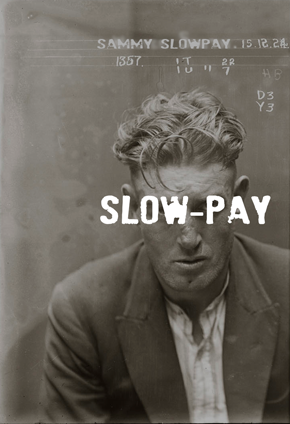It’s a hazard of the profession – sometimes a client will try to weasel out of payment.
The Question
A client did not pay me for software work. What should I do?
I created a tax website for a client of mine recently. He used my server for all his customers work but after tax season he refused to pay me my commission. I still have his customers data on my server. Shall I email them and let them know that their accountant is a scum bag? Can I be sued for that?
My Answer
Sorry to hear you’re in a bind with this client. I’ve been there and I know it feels awful.
I’m curious about this:
after tax season he refused to pay me my commission
Your question began with “a client did not pay me”, but…did the client ever explicitly agree to pay your commission in the first place? If not by an actual contract, then even by text or e-mail? If so, you *might* have a contract that is enforceable, depending on the law where you live. I am not a lawyer and this is not legal advice, but it’s worth looking into.
And has the client actually refused, or simply gone silent? If he explicitly refused, what were his reasons?
Sometimes – not always, but sometimes – simply reminding someone that:
- they agreed to pay X in exchange for you doing Y, and
- you’ve done Y, so it’s time for them to pay X
can be enough to get them to own up and make payment.
Once you’ve educated your client on the agreement he entered into, move on to enumerating the consequences of non-payment (these consequences should not include e-mailing his customers to tell them he’s a deadbeat, by the way). Since tax season is over, taking down his site or cutting off access to the server may not be much of an incentive, but by all means, put it on the table. If going to court to obtain a judgement against him is a potential outcome, make that clear as well. If your client is licensed, contact the licensing or regulatory agency and see if they’ve run afoul of any regulations by not paying you. Some regulatory agencies take a dim view of their licensees causing “client did not pay me” scenarios.
Remember – this is not legal advice, so please consult an attorney to make sure that whatever you intend to do is within the bounds of the law.
If your client continues to explicitly refuse to pay, you need to hold the line and actually follow through on whatever consequences you enumerated.
- Did you inform him that his site will go down for lack of payment? Then follow through on it.
- Did you inform him that you’ll take the matter to small claims? Then follow through on it.
- Did you inform him that you’d be contacting his licensing agency? Then follow through on it.
Enumerating consequences is useless without follow-up.
 Ultimately, it’s possible that you could discontinue hosting the site and even win a judgement in small claims, and still not get paid. But do pursue payment vigorously, withing the bounds of what was agreed to between you.
Ultimately, it’s possible that you could discontinue hosting the site and even win a judgement in small claims, and still not get paid. But do pursue payment vigorously, withing the bounds of what was agreed to between you.
And in the meantime, get back out there & start cultivating relationships with new potential clients. Just make sure that next time, you avoid the “client did not pay me” scenario by taking these precautions:
- Screen the client better. Very often, a potential client will present some clear red flags during the initial consultation. Trust your gut on this. I bet that if you think back, you’ll be able to identify things with this client that you should have seen a red flag early on.
- Get payment up-front. You’re not an investor; you’re a vendor. You’re not obligated to extend credit to your clients. I know freelancers who take 100% payment up-front. You may or may not be presenting as a strong enough professional to do that, but I bet you could get 33% – 50% up front.
- Don’t enter into contingent-payment arrangements. You mentioned that the client owed you a commission; this is probably the worst way a freelancer can work. Again – you are a vendor, not an investor. Vendors get paid. Vendors do not shoulder any risk. The risk of your client’s business endeavors rightfully belongs to your client, not you.
* * * * * * * * * * * * * * * *
The answer above is based on material from Conquering Client Conflict, a free 10-day e-mail course that helps freelancers and consultants to make more money & get more respect by resolving common conflict scenarios. Are these types of problems common in your business? If so, sign up for Conquering Client Conflict today and start improving the quality and profitability of your freelancing business. Good luck!
